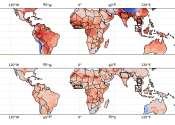Modeling broader effects of wildfires in Siberia
As wildfires in Siberia become more common, global climate modeling estimates significant impacts on climate, air quality, health, and economies in East Asia and across the northern hemisphere.

As wildfires in Siberia become more common, global climate modeling estimates significant impacts on climate, air quality, health, and economies in East Asia and across the northern hemisphere.
Earth Sciences
1 hour ago
0
46

Extreme heat scorched parts of South and Southeast Asia Wednesday, prompting schools across the Philippines to suspend classes, heat warnings in the Thai capital and worshippers in Bangladesh to pray for rain.
Environment
2 hours ago
0
2

Nature-based climate solutions can help mitigate climate change, especially in forested regions capable of storing and sequestering vast amounts of carbon. New research published in Global Change Biology indicates that a ...
Earth Sciences
7 hours ago
0
13

Negotiators from 175 nations began talks Tuesday on a proposed global treaty to reduce plastic pollution, which is found everywhere from mountain tops to ocean depths, and in human blood and breast milk.
Environment
18 hours ago
0
40

Plastic pollution spans the globe, yet national policies are generally not effective enough, and have so far focused primarily on waste management rather than targeting the root cause. To make matters worse, the global trade ...
Environment
21 hours ago
0
2

A new statistical analysis of the interaction between El Niño and rising global temperatures due to climate change concludes that the approaching summer in the tropics has nearly a 7 in 10 chance of breaking records for ...
Earth Sciences
Apr 22, 2024
6
838

Negotiators from 175 countries are meeting from Tuesday in Canada to nail down a binding global treaty to end plastic pollution with many sticking points to be resolved five months after the last round of talks in Kenya.
Environment
Apr 22, 2024
0
6

Letters written by the famous mountaineer George Mallory have been made available to a global audience for the first time, in the centenary year of his fatal attempt to scale Everest.
Other
Apr 21, 2024
0
0

Californians have had weekend after weekend of cool, stormy weather and the Sierra Nevada has been blessed with a healthy snowpack. But the reality is that even the last few months have been more than 2 degrees hotter than ...
Environment
Apr 21, 2024
1
118

In Mali's capital Bamako, Aboubacar Pamateck runs a scarf under a trickle of water and wraps it around his head to cope with the West African nation's soaring heat.
Environment
Apr 21, 2024
0
48
Globalization refers to the increasing unification of the world's economic order through reduction of such barriers to international trade as tariffs, export fees, and import quotas. The goal is to increase material wealth, goods, and services through an international division of labor by efficiencies catalyzed by international relations, specialization and competition. It describes the process by which regional economies, societies, and cultures have become integrated through communication, transportation, and trade. The term is most closely associated with the term economic globalization: the integration of national economies into the international economy through trade, foreign direct investment, capital flows, migration, the spread of technology, and military presence. However, globalization is usually recognized as being driven by a combination of economic, technological, sociocultural, political, and biological factors. The term can also refer to the transnational circulation of ideas, languages, or popular culture through acculturation. An aspect of the world which has gone through the process can be said to be globalized. Against this view, an alternative approach stresses how globalization has actually decreased inter-cultural contacts while increasing the possibility of international and intra-national conflict.
This text uses material from Wikipedia, licensed under CC BY-SA